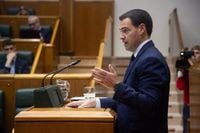In a significant development for the Basque public education system, the unions Steilas, LAB, CCOO, UGT, and Interinok reached an agreement with the Department of Education on May 9, 2025, effectively averting a planned week-long strike. The agreement, finalized around 11:00 PM, includes all major unions except ELA, which opted to distance itself from the consensus.
The newly established agreement outlines several key changes aimed at improving the educational environment. Notably, the maximum number of students per class in Primary Education will decrease from 23 to 22. Additionally, for Early Childhood Education groups with mixed-age students (excluding those aged 2 and 3), the maximum student ratio will drop from 20 to 19. This change is expected to enhance the quality of education by allowing teachers to focus more on individual student needs.
Furthermore, the agreement stipulates a salary increase of 2% effective from the month following the signing, continuing until August 2026, followed by an additional 2.5% increase in the next two academic years. This cumulative raise amounts to a total salary increase of 7%. In response to long-standing demands, a formula for early retirement has also been included, allowing teachers to retire up to 18 months earlier than the standard age while accumulating reductions in their working hours from the age of 60.
During this early retirement period, teachers will be able to leave their positions for a year and three months, with the remaining three months free from direct teaching responsibilities. The agreement also aims to reduce the temporary employment rate to below 5% and opens the door for negotiations regarding the opposition model for teaching positions.
In terms of workload, significant reductions have been made to teaching hours. In Early Childhood and Primary Education, the maximum teaching hours will be set at 21 hours, with a gradual increase to 22 hours in the 2025-2026 academic year, and a subsequent return to 21 hours thereafter. For Secondary Education, special education, and Vocational Training, the teaching load will be capped at 17 hours, including programs like Hedatzen or similar initiatives.
Begoña Pedrosa, the Basque Education Minister, expressed satisfaction with the agreement, stating, "We have achieved what the Basque public school truly needs." She described the agreement as a transformative step for the educational system, reinforcing its foundations and addressing the requests from various educational centers. Pedrosa emphasized the government's commitment to continue negotiations until a satisfactory resolution is reached, highlighting the recent approval of education agreements that had been pending for years.
In recent weeks, the Basque Government has engaged in numerous discussions with unions, as tensions have risen over the state of public education. The unions had previously rejected an earlier proposal, citing insufficient progress on key issues such as salary increases and the renewal of teaching staff. They argued that the proposed salary increase of 6% over three years, divided into a guaranteed 3% and an additional 3% contingent on GDP growth, was inadequate to meet their needs.
Union representatives have voiced concerns about the lack of significant advancements in the latest proposals. Miren Zubizarreta from ELA criticized the government's offer, stating it not only fell short of expectations but also represented a regression in some areas. The unions are demanding more comprehensive measures to alleviate workload, a realistic plan for rejuvenating the teaching staff, and assurances against the restructuring and closure of public educational facilities.
As the negotiations progressed, Lehendakari Imanol Pradales reiterated the importance of a responsible and collaborative approach to resolving the ongoing labor conflict. He called for a focus on improving the Basque public education system, urging all parties to engage in constructive dialogue without imposing red lines. Pradales emphasized the need for a political leadership that could effectively navigate the complexities of educational reform.
"Until 8:00 AM on Monday, May 12, 2025, an agreement is possible. Better to achieve it today than tomorrow, but it will not be for lack of trying until the last moment," he stated, underscoring the urgency of reaching a consensus.
As the situation evolves, the unions and the government continue to emphasize their commitment to enhancing the educational framework in the Basque Country. The agreement reached on May 9 is seen as a crucial step towards addressing the pressing challenges faced by educators and students alike.
In summary, the recent agreement marks a pivotal moment for Basque education, reflecting a collaborative effort to enhance the quality of public schooling while addressing the concerns of educators. With ongoing negotiations and a shared commitment to improvement, the future of the Basque educational system appears to be on a promising path, provided that all parties remain engaged and willing to compromise.







